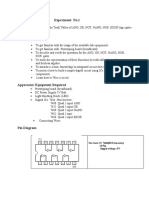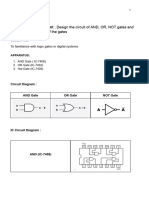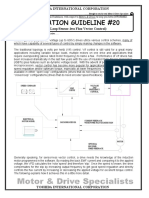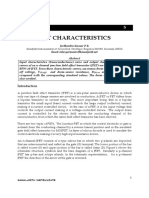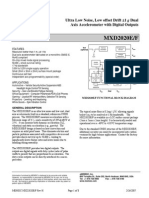0 ratings0% found this document useful (0 votes)
486 viewsDigital Logic Gates Experiment
Digital Logic Gates Experiment
Uploaded by
Hanna AbejoThis document describes an experiment involving digital logic gates. The objectives are to specify the output of gates based on their inputs, investigate the behavior and implementation of integrated circuit (IC) gates, and use single ICs to produce different gate types. The document discusses logic signals, common gate types (AND, OR, NOT), NAND gates, and how to construct gates using ICs. Procedures are provided to construct circuits using NAND and NOR gates from ICs and obtain their truth tables. Guidelines are given for factors to consider in gate construction and the relationship between NAND and NOR operations.
Copyright:
© All Rights Reserved
Available Formats
Download as DOCX, PDF, TXT or read online from Scribd
Digital Logic Gates Experiment
Digital Logic Gates Experiment
Uploaded by
Hanna Abejo0 ratings0% found this document useful (0 votes)
486 views13 pagesThis document describes an experiment involving digital logic gates. The objectives are to specify the output of gates based on their inputs, investigate the behavior and implementation of integrated circuit (IC) gates, and use single ICs to produce different gate types. The document discusses logic signals, common gate types (AND, OR, NOT), NAND gates, and how to construct gates using ICs. Procedures are provided to construct circuits using NAND and NOR gates from ICs and obtain their truth tables. Guidelines are given for factors to consider in gate construction and the relationship between NAND and NOR operations.
Original Description:
This is a document about the experiment conducted about the basics of digital logic gates
Copyright
© © All Rights Reserved
Available Formats
DOCX, PDF, TXT or read online from Scribd
Share this document
Did you find this document useful?
Is this content inappropriate?
This document describes an experiment involving digital logic gates. The objectives are to specify the output of gates based on their inputs, investigate the behavior and implementation of integrated circuit (IC) gates, and use single ICs to produce different gate types. The document discusses logic signals, common gate types (AND, OR, NOT), NAND gates, and how to construct gates using ICs. Procedures are provided to construct circuits using NAND and NOR gates from ICs and obtain their truth tables. Guidelines are given for factors to consider in gate construction and the relationship between NAND and NOR operations.
Copyright:
© All Rights Reserved
Available Formats
Download as DOCX, PDF, TXT or read online from Scribd
Download as docx, pdf, or txt
0 ratings0% found this document useful (0 votes)
486 views13 pagesDigital Logic Gates Experiment
Digital Logic Gates Experiment
Uploaded by
Hanna AbejoThis document describes an experiment involving digital logic gates. The objectives are to specify the output of gates based on their inputs, investigate the behavior and implementation of integrated circuit (IC) gates, and use single ICs to produce different gate types. The document discusses logic signals, common gate types (AND, OR, NOT), NAND gates, and how to construct gates using ICs. Procedures are provided to construct circuits using NAND and NOR gates from ICs and obtain their truth tables. Guidelines are given for factors to consider in gate construction and the relationship between NAND and NOR operations.
Copyright:
© All Rights Reserved
Available Formats
Download as DOCX, PDF, TXT or read online from Scribd
Download as docx, pdf, or txt
You are on page 1of 13
EXPERIMENT 3
DIGITAL LOGIC GATES
I. OBJECTIVES
1. Be able to specify what the output will be when the input is zero and what the
output will be when the input is one.
2. Be able to investigate the logic behavior, characteristics and implementation of
various IC gates.
3. To use the single IC 7400 to produce different types of gates.
4. To use the single IC 7402 to produce different types of gates.
II. THEORY
In logic signals voltage signal with zero (0) corresponding to 0 volts and one (1)
corresponding to five or three volts. A sinusoidal signal with zero corresponding to some
frequency, and one corresponding to some other frequency. Once we have the concept
of a logic signal we can talk about operations that can be performed on logic signals.
Begin by assuming we have two logic signals, A and B. Then assume that those two
signals form an input set to some circuit that takes two logic signals as inputs, and has
an output that is also a logic signal. That situation is represented below.
The output, C, depends upon the inputs, A and B. There are many different ways that C
could depend upon A and B. The output, C, is a function, - a logic function - of the
inputs, A and B.
AND GATES
An AND function can be implemented electrically using a device known as an AND
gate. You might imagine a system in which zero (0) is represented by zero (0) volts and
one (1) is represented by three (3) volts. To get a logical zero, connect the input of the
gate to ground to have zero (0) volts input. To get a logical one, connect the input of the
gate to a five (5) volts source to have five volts at the input.
OR GATES
An OR gate is a gate for which the output is 1 whenever one or more of the
inputs is 1. The output of an OR gate is 0 only when all inputs are 0.
NOT Gates (Inverters)
A third important logical element is the inverter. An inverter does pretty much what
it says. If the input is 0, the output is 1. Conversely, if the input is 1, the output is 0.
NAND Gates
There is another important kind of gate, the NAND gate. Actually, the way to start
thinking about a NAND gate is to think of it as an AND gate with an inverter on the
output.
III. MATERIALS
- 7400 IC (quadruple twoinput NAND gates)
- 7402 IC (quadruple twoinput NOR gates)
- 7404 IC (hex inverters)
- 7408 IC (quadruple twoinput AND gates)
- 7432 IC (quadruple twoinput OR gates)
IV. PROCEDURES
Using a single 7400 IC, construct a circuit with NAND gates that implements the
Boolean function
F= AB + CD
F= ((AB) (CD))
F= [(A NAND B) NAND (C NAND D)]
1. Draw the circuit diagram
2. Obtain the truth table for F as a function of the tour inputs
A B C D F
0 0 0 0 0
0 0 0 1 0
0 0 1 0 0
0 0 1 1 1
0 1 0 0 0
0 1 0 0 0
0 1 1 0 0
0 1 1 1 1
1 0 0 0 0
1 0 0 1 0
1 0 1 0 0
1 0 1 1 1
1 1 0 0 1
1 1 0 1 1
1 1 1 0 1
1 1 1 1 1
V. DATA AND OBSERVATION
TRUTH TABLE
X Y F
7400 NAND GATES
0
0
1
1
0
1
0
1
1
1
1
0
7402 NOR GATES
0
0
1
1
0
1
0
1
1
0
0
0
7404 INVERTER
0
1
1
0
7408 AND GATES
0
0
1
1
0
1
0
1
0
0
0
1
7432 OR GATES
0
0
1
1
0
1
0
1
0
1
1
1
7486 XOR GATES
0
0
1
1
0
1
0
1
0
1
1
0
UNIVERSAL NAND GATE
X Y F
a. An inverter 0 1
1 0
b. A two-input OR 0 0 0
0 1 0
1 0 0
1 1 1
X y F
c. A two-input OR 0 0 0
0 1 1
1 0 1
1 1 1
d. A two-input NOR 0 0 1
0 1 0
1 0 0
1 1 0
e. A two-input XOR 0 0 0
0 1 1
1 0 1
1 1 0
VI. COMPUTATION
a. An inverter
0
0
0
1
1
1
1
1
0
1
1
0
Input output
b. A two-input AND
c. A two-input OR
d. A two-input NOR
e. A two-input XOR
VII. CIRCUIT DIAGRAM
UNIVERSAL NAND
a. An inverter
b. A two-input AND
c. A two-input OR
d. A two-input XOR
e. A two-input NO
UNIVERSAL NAND
LOGIC DIAGRAM AND BOOLEAN ALGEBRA
a. Inverter
(X.1) = X
X = X
b. Two-input AND
[ (XY) (1)] = XY
( X + Y) = XY
XY = XY
c. Two-input OR
(XY) = (X+Y)
(X+Y) = (X+Y)
d. Two-input NOR
[(XY) (1)] = (X+Y)
[(XY)] = (X+Y)
(X+Y) = (X+Y)
e. Two-input XOR
[ (X (XY)) (Y (XY))] = XY+YX
X (XY) + Y (XY) = XY +YX
X(X+Y) + Y(X+Y) = XY +YX
XX + YX +YX +YY = XY +YX
XY +YX = XY +YX
NOR GATE
UNIVERSAL NOR
a. Inverter
(X+0) = X
X = X
b. AND
(X +Y) = XY
XY = XY
c. OR
((X + Y) + (X + Y))
(XY + XY) = X + Y
(XY) = X + Y
X + Y = X + Y
d. NAND
(((X + 0) + (Y + 0) + (X + 0) + (Y + 0)))
((X + Y) + (X + Y))
(XY + XY) = (XY)
(XY) = (XY)
VIII. GUIDE QUESTIONS
1. What are the factors to be weighed in considering the construction of other types
of logic gates?
Factors to be weighed in considering the construction of other types of
logic gates are (1) the feasibility and economy of producing the gate with
physical components, (2) the possibility of extending the gate to more than
two inputs, (3) the basic properties of the binary operator, such as
commutativity and associativity, and (4) the ability of the gate to implement
Boolean functions alone or in conjunction with other gates.
2. What does the inverter circuit inverts?
The inverter circuit inverts the logic sense of a binary variable, producing
the NOT, or complement, function.
3. How do you define the buffer with bubble circuit of inverter?
The small circle in the output of the graphic symbol of an inverter (referred
to as bubble) designated the logic complement.
4. Why does NAND & NOR gates more popular than their complement
counterparts?
This is because NAND and NOR gates are easily constructed with
transistor circuits and because digital circuits can be easily implemented
with them. These gates are easier to fabricate with electronic components
and are the basic gates used in all IC digital logic families.
5. How do you implement a Boolean function with NAND gates in a convenient
way?
To show that any Boolean function can be implemented with NAND gates,
we need only show that the logical operations of AND, OR, and
complement can be obtained with NAND gates alone.
6. What is the connection of NOR operation to NAND operation?
The NOR operation is the dual of the NAND operation. Therefore, all
procedures and rules for NOR logic are the duals of the corresponding
procedures and rules developed for NAND logic.
7. How do you recognize the AND OR diagram from NOR diagram?
The equivalent AND OR diagram can be recognized from the NOR
diagram by removing all the bubbles. To compensate for the bubbles in
four inputs, it is necessary to complement the corresponding input literals.
8. Why is the conversion from positive to negative logic and vice versa essential?
The conversion from positive to negative logic and vice versa is
essentially an operation that changes 1s to 0s and 0s to 1s in both the
inputs and the output of a gate.
9. To get the output of F, how do you simplify F in AND OR INVERT?
We have to simplify F into Sum of products form by combining 0s in
the map.
10. What are the procedure for converting a multilevel AND OR diagram into an all
NAND diagrams?
1. Convert all AND gates to NAND gates with AND invert graphic
symbols.
2. Convert all OR gates to NAND gates with invert OR graphic symbols.
3. Check all the bubbles in the diagram. For every bubble that is not
compensated by another small circle along the same line, insert an
inverter (a one input NAND gate) or complement the input literal.
IX. SUPPLEMENTARY QUESTIONS
1. Give the truth table of the given functions (through simulation)
Solution:
F
1
= xy + xy = y
F
2
= xy + xy = xy
F
3
= x + xy
Answer:
x y F
1
F
2
F
3
0 0 1 0 1
0 1 0 0 1
1 0 1 1 0
1 1 0 0 1
2. Provide a 3 input function that will have an output of logic 1 whenever there are
two or more input of 0.
Truth Table:
x y z F
0 0 0
0 0 1
0 1 0
0 1 1
1 0 0
1 0 1
1 1 0
1 1 1
Solution:
F = xyz + xyz + xyz + xyz
F = xyz + xyz + xyz + xyz
F = yz + x(yz + yz)
F = yz + x(y XOR z)
X. CONCLUSIONS
I therefore conclude that using a 7400 IC which is a quadruple two input NAND
gates we can implement different types of logical gates such us a INVERTERS, AND,
OR, NAND, NOR, and, XOR gates. From which we can found in different type of ICs.
The same with the 7402 IC which is a quadruple two input NOR gates and can also
implement different type of logical gates the same with the AND gate. Both ICs called a
universal one for they can be used in different type of logical gates which is really
helpful to the upcoming experiments while gaining the application of this experiment.
You might also like
- Nihon Kohden Neurofax EEG 9100 9200 User Manual PDFDocument438 pagesNihon Kohden Neurofax EEG 9100 9200 User Manual PDFfredy7878100% (1)
- Universal TV Mainboard Schematic DiagramsDocument50 pagesUniversal TV Mainboard Schematic DiagramsPabloSanabria95% (44)
- DSD Lab ManualDocument64 pagesDSD Lab ManualAkkonduru KumarNo ratings yet
- Digital Electronics 3rd SemDocument39 pagesDigital Electronics 3rd SemPriyanshu ThawaitNo ratings yet
- Hardware Lab-I: (CS-217) Instruction ManualDocument36 pagesHardware Lab-I: (CS-217) Instruction Manualmaen2009No ratings yet
- 20bce2919 VL2020210700016 Ast01Document54 pages20bce2919 VL2020210700016 Ast01Sudarshan BhattaNo ratings yet
- Lab 1 Digital Logic Gates and Boolean FunctionsDocument7 pagesLab 1 Digital Logic Gates and Boolean FunctionsIfthakharul Alam Shuvo100% (1)
- Dpco Lab Record ItDocument75 pagesDpco Lab Record Itdarshanjeyakumar56No ratings yet
- Experiment No.1 Aim: Objective:: Not Gate: IC 7404 (HEX Inverter) 14 Pin Supply Voltage:5vDocument10 pagesExperiment No.1 Aim: Objective:: Not Gate: IC 7404 (HEX Inverter) 14 Pin Supply Voltage:5vCharanpreet SinghNo ratings yet
- DcsDocument50 pagesDcskartikNo ratings yet
- CSC205Document42 pagesCSC205puppetpawn7No ratings yet
- Modified DLD Lab ManualsDocument40 pagesModified DLD Lab ManualsASHEESH TiwariNo ratings yet
- De Lab Manual 21-22Document46 pagesDe Lab Manual 21-22AUTHOR SOULNo ratings yet
- Lab Report Electronics 5thDocument18 pagesLab Report Electronics 5thMuhammad kawish iqbal100% (1)
- DLD ManualDocument34 pagesDLD ManualmkollamNo ratings yet
- Experiment No.1 Digital Logic Gates Familirization: I. ObjectivesDocument8 pagesExperiment No.1 Digital Logic Gates Familirization: I. ObjectivesJun TobiasNo ratings yet
- Lab Manual FOR Computer Organization LabDocument13 pagesLab Manual FOR Computer Organization Labhifzan786No ratings yet
- IDS Lab ManualDocument38 pagesIDS Lab ManualÃMĪT KUMAR SINGHNo ratings yet
- Lab. Activity 5 Coincidence GatesDocument6 pagesLab. Activity 5 Coincidence Gates신경혜No ratings yet
- Computer Organization Lab 17012013Document22 pagesComputer Organization Lab 17012013R K S B O TNo ratings yet
- Bca I Semester Subject Code: BCA-104P ELECTRONICS: Laboratory ManualDocument24 pagesBca I Semester Subject Code: BCA-104P ELECTRONICS: Laboratory ManualGamplayNo ratings yet
- Cs8382-Digital Systems Laboratory-Digital Lab ManualDocument74 pagesCs8382-Digital Systems Laboratory-Digital Lab ManualPrabu KumarNo ratings yet
- CSE Digital Systems Lab Anand SirDocument38 pagesCSE Digital Systems Lab Anand SirComic FactionNo ratings yet
- EC Lab4 202211008 MergedDocument78 pagesEC Lab4 202211008 Mergedmexodic205No ratings yet
- DIGITALDocument108 pagesDIGITALsivagamasundhariNo ratings yet
- DE Practical File CSE 3rd Sem Dec'24Document44 pagesDE Practical File CSE 3rd Sem Dec'24NARENDERNo ratings yet
- Lab Manual - Analog & Digital Electronics (ESC 301)Document66 pagesLab Manual - Analog & Digital Electronics (ESC 301)anikdebnath081No ratings yet
- De Lab PDFDocument36 pagesDe Lab PDFNaveen Yallapu100% (1)
- EC Lab4 (202211028)Document44 pagesEC Lab4 (202211028)akashkadalisriNo ratings yet
- DPCO ManualDocument72 pagesDPCO Manualg2272049No ratings yet
- LAB-MANUAL-COMPUTER-LOGICDocument15 pagesLAB-MANUAL-COMPUTER-LOGICibrahimaNo ratings yet
- Digital Logic Design Lab FileDocument44 pagesDigital Logic Design Lab FileKiranmai KonduruNo ratings yet
- Lab FlipflopsDocument71 pagesLab FlipflopsDani Raj100% (1)
- Exp3 Universal Gates 1Document23 pagesExp3 Universal Gates 1Joie Marie Yadao BulawanNo ratings yet
- DigitalDocument186 pagesDigitalAnushaChittiNo ratings yet
- Reference Lab Manual: CSC302 - Digital Logic Design and AnalysisDocument72 pagesReference Lab Manual: CSC302 - Digital Logic Design and AnalysisTheSkyof JoynessKnowledge100% (1)
- CSE 231 Lab ManualDocument34 pagesCSE 231 Lab Manualdettol skincare33% (3)
- Lab Manual EC AllDocument383 pagesLab Manual EC Allanshuj11No ratings yet
- Manu Gupta 25071Document19 pagesManu Gupta 25071Manu GuptaNo ratings yet
- Org Solved QPDocument10 pagesOrg Solved QPshoaibakthar231No ratings yet
- Experiment Name: Study of Basic Logic GatesDocument17 pagesExperiment Name: Study of Basic Logic GatesA K M Fahim Faysal (182016018)No ratings yet
- DC Lab ManualDocument71 pagesDC Lab ManualVishal NairNo ratings yet
- Chap 2 Logicgates and Logic FamiliesDocument69 pagesChap 2 Logicgates and Logic Familiesvsjadhav1085No ratings yet
- Dld Report (1)Document40 pagesDld Report (1)nadiaakter2934No ratings yet
- 23ECB221-DE Lab ManualDocument51 pages23ECB221-DE Lab Manualsgtech.202324No ratings yet
- EC Lab4 202211008 MergedDocument78 pagesEC Lab4 202211008 Mergedmexodic205No ratings yet
- DSD Lab ManualDocument65 pagesDSD Lab Manualmjeevansai07No ratings yet
- Digital Electronics - Lab ManualDocument30 pagesDigital Electronics - Lab ManualvigneshwarreddymeruguNo ratings yet
- Index: S.No Experiment Name Date of Experiment Date of Submission Remark & Sign 1Document32 pagesIndex: S.No Experiment Name Date of Experiment Date of Submission Remark & Sign 1Ritwik KumarNo ratings yet
- Manual1Document18 pagesManual1ibrahimaNo ratings yet
- Digital CircuitsDocument15 pagesDigital CircuitsShahriar KayesNo ratings yet
- Lab Manual - DF - 3130704Document26 pagesLab Manual - DF - 3130704Unknown Person456No ratings yet
- Lab Report 2Document10 pagesLab Report 2Bappy HossenNo ratings yet
- Lab2 - Logic Simplification Using Universal GatesDocument6 pagesLab2 - Logic Simplification Using Universal GatesSaddam KhanNo ratings yet
- Design of Logic Gates and Their ApplicationsDocument22 pagesDesign of Logic Gates and Their ApplicationsAditya ChallaNo ratings yet
- Lecture 6 Universal GatesDocument32 pagesLecture 6 Universal GatesPeterArnoldNo ratings yet
- Basic Logic ComputationDocument18 pagesBasic Logic ComputationibrahimaNo ratings yet
- Ismail - Manual DLD Lab.Document28 pagesIsmail - Manual DLD Lab.Ismail SalmanNo ratings yet
- Digital Electronics LabDocument34 pagesDigital Electronics LabJuno Hera Magallanes Huyan100% (1)
- Beee Unit - 4Document24 pagesBeee Unit - 4Pradeev BalakrishnanNo ratings yet
- Analog Electronic Experiment No. 1b (Digital)Document18 pagesAnalog Electronic Experiment No. 1b (Digital)SatyamNo ratings yet
- Build Logic Gates with Universal NAND: CMOS and TTL in ActionFrom EverandBuild Logic Gates with Universal NAND: CMOS and TTL in ActionNo ratings yet
- Different Examples of HDLDocument12 pagesDifferent Examples of HDLHanna Abejo0% (1)
- LTH Band FilterDocument2 pagesLTH Band FilterHanna AbejoNo ratings yet
- References of Nyquist FilterDocument22 pagesReferences of Nyquist FilterHanna AbejoNo ratings yet
- Experiment - Binary and Decimal NumbersDocument6 pagesExperiment - Binary and Decimal NumbersHanna Abejo0% (1)
- ECG Sample ExperimentDocument3 pagesECG Sample ExperimentHanna AbejoNo ratings yet
- EMI IC Application Aug 2Document25 pagesEMI IC Application Aug 2shri.bhairavkar6977No ratings yet
- Lokesh CV MTech VLSI DIAT PDFDocument1 pageLokesh CV MTech VLSI DIAT PDFlokeshprasadgantaNo ratings yet
- ERICSSON Avp3000Document4 pagesERICSSON Avp3000HedsdasNo ratings yet
- Detection and Jamming Low Probability of Intercept RadarDocument123 pagesDetection and Jamming Low Probability of Intercept Radarknightatarms50% (2)
- Transmission Line Fault Analysis - To - STDDocument10 pagesTransmission Line Fault Analysis - To - STDBhanuNo ratings yet
- Mechanical Designer or PCB Designer or Electronics Packaging orDocument4 pagesMechanical Designer or PCB Designer or Electronics Packaging orapi-121406632No ratings yet
- Data Sheet 6ES7323-1BL00-0AA0: Supply VoltageDocument3 pagesData Sheet 6ES7323-1BL00-0AA0: Supply VoltageQuy HoangNo ratings yet
- Easypic2 ManualDocument17 pagesEasypic2 Manualadresa33No ratings yet
- Open Loop Vs Sensor Less Flux Vector ControlDocument3 pagesOpen Loop Vs Sensor Less Flux Vector ControlDavor JunušićNo ratings yet
- JFET Characteristics PDFDocument9 pagesJFET Characteristics PDFSougata GhoshNo ratings yet
- ThinkPad T470 VS ThinkPad T480comparison 201911080527Document2 pagesThinkPad T470 VS ThinkPad T480comparison 201911080527Vijay Anand PandianNo ratings yet
- Ceragon FibeAir IP-20C Brochure ETSIDocument4 pagesCeragon FibeAir IP-20C Brochure ETSIRicardo PajeuNo ratings yet
- Lab 4 Am & FM ModulationDocument46 pagesLab 4 Am & FM ModulationMimi Syuryani Binti NodinNo ratings yet
- Onkyo tx-nr636Document108 pagesOnkyo tx-nr636ezeicom.fm4879No ratings yet
- Aut & Mt-Ii LabDocument4 pagesAut & Mt-Ii LabRajaNo ratings yet
- Akai Pdp4216m (SM)Document86 pagesAkai Pdp4216m (SM)ricardoNo ratings yet
- Position and Speed Control For Dish DC Motor: ObjectivesDocument4 pagesPosition and Speed Control For Dish DC Motor: ObjectivesGoran MiljkovicNo ratings yet
- Preventa: XPSMC Safety ControllersDocument48 pagesPreventa: XPSMC Safety ControllersJorge Landim CarvalhoNo ratings yet
- Wireless Mobile CommunicationDocument23 pagesWireless Mobile CommunicationVipul SharmaNo ratings yet
- Asus Eee PC 701Document47 pagesAsus Eee PC 701Rosangela MariaNo ratings yet
- Substation CommissioningDocument34 pagesSubstation CommissioningSALAH SALLAMNo ratings yet
- Hex Inverted Buffers With Open-Collector Outputs: KK74LS06Document4 pagesHex Inverted Buffers With Open-Collector Outputs: KK74LS06kimxoNo ratings yet
- MXD2020EDocument8 pagesMXD2020Eapi-3695729No ratings yet
- Meley Moore MachineDocument8 pagesMeley Moore MachineRajit KuthialaNo ratings yet
- Mainboard: Chipset To Power CircuitDocument4 pagesMainboard: Chipset To Power Circuitragav1234No ratings yet
- BA679/BA679S: RF PIN DiodesDocument4 pagesBA679/BA679S: RF PIN Diodesparsa mahvisNo ratings yet
- 2nd Sem CA NotesDocument176 pages2nd Sem CA NotesKaen SenpaiNo ratings yet
- Transmission Line MCQDocument3 pagesTransmission Line MCQkgopinath060201No ratings yet








